NCERT Solutions for Class 10 Civics Chapter 1 – Power Sharing
NCERT Solutions for Class 10 Civics Chapter 1 – Power Sharing are essential for understanding how democratic power is shared among different levels and institutions of government in the CBSE curriculum. These well-structured answers help students grasp topics like power-sharing arrangements in Belgium and Sri Lanka, and the benefits of inclusive governance. Designed as per the latest syllabus, these solutions strengthen conceptual clarity and improve exam preparation. Ideal for revision and practice, they promote deeper understanding of democratic functioning, making them a valuable study tool for scoring well in Class 10 Social Science exams.
NCERT Solutions For Class 10 Civics – Power Sharing – Exercise Images
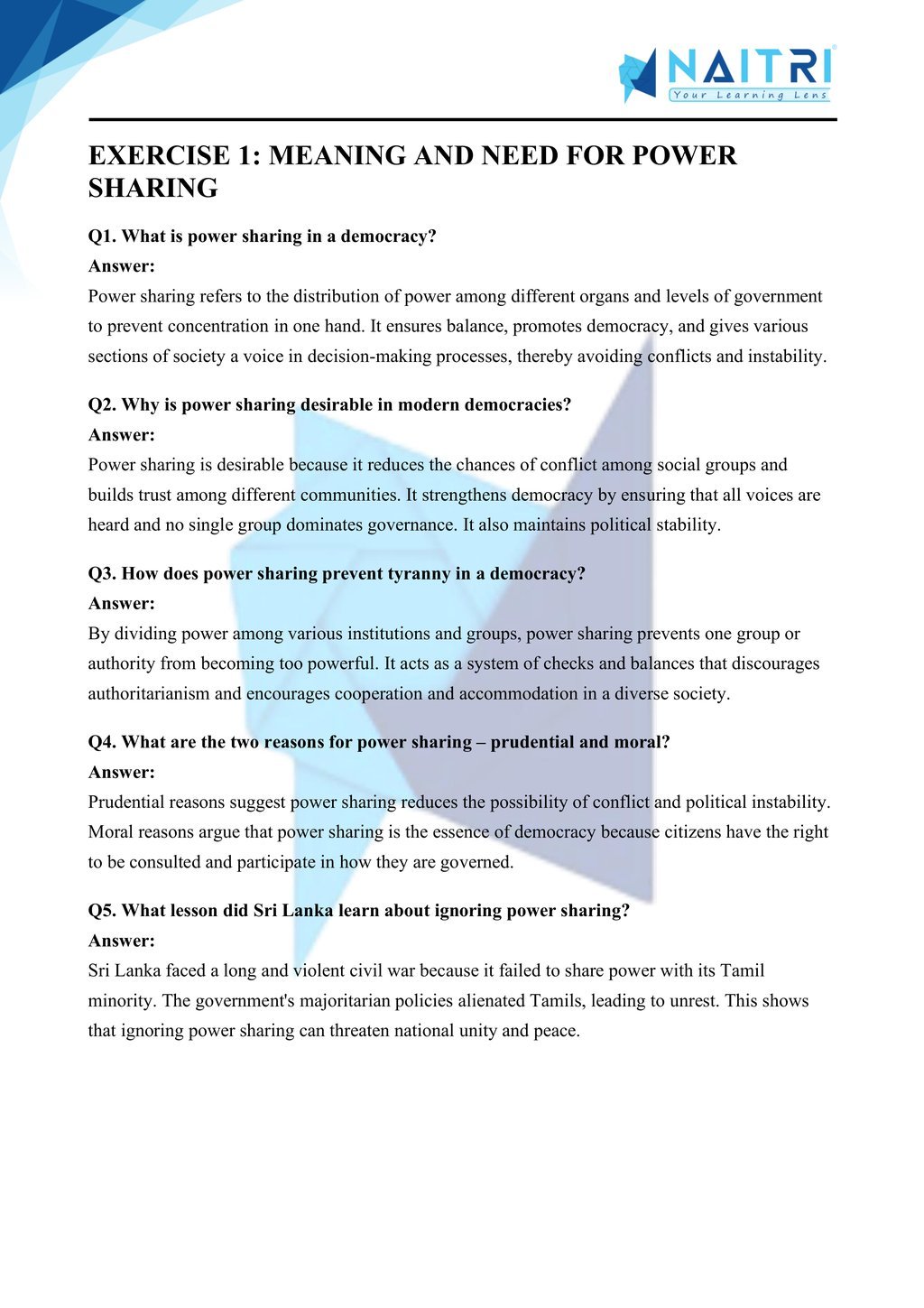
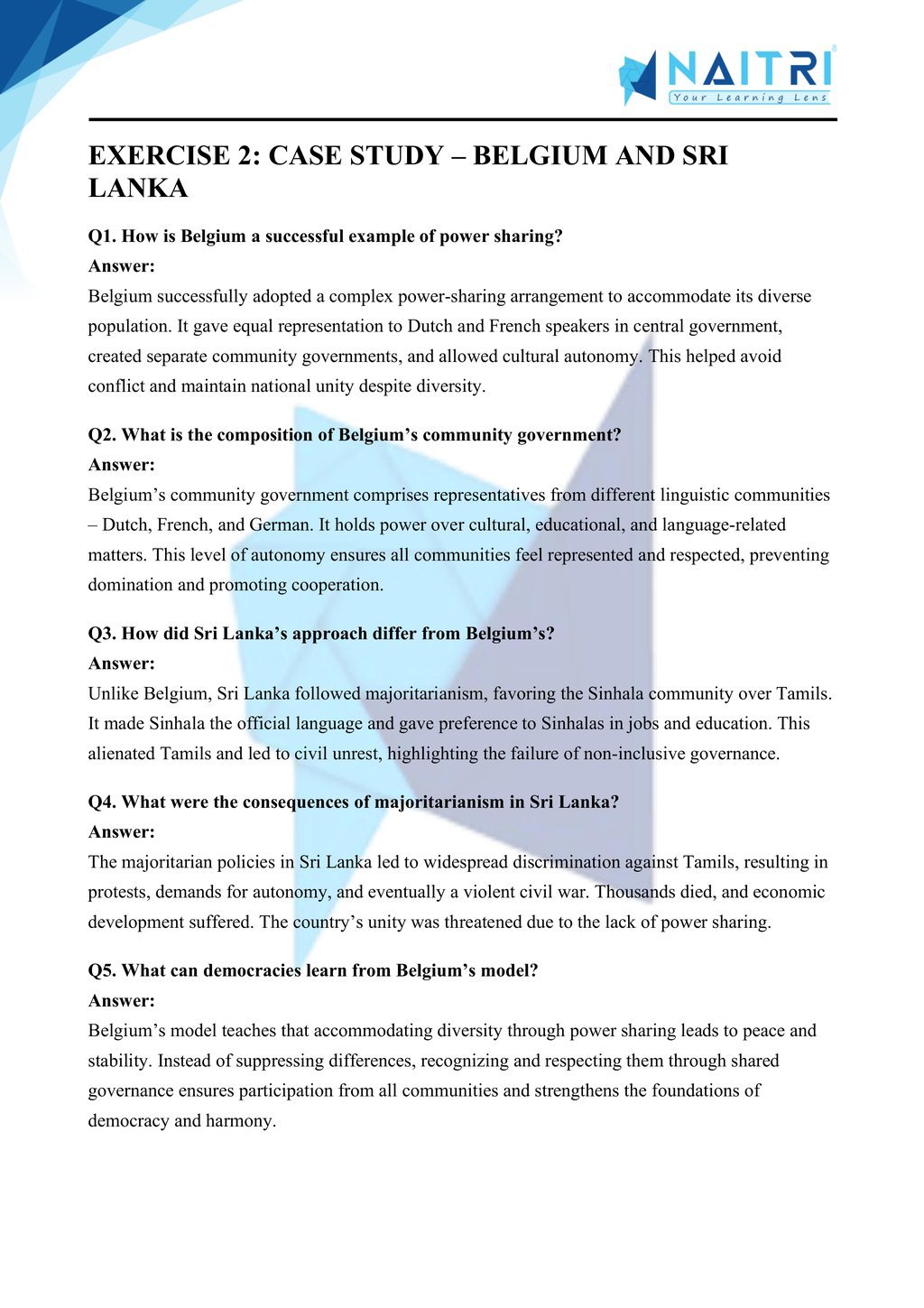
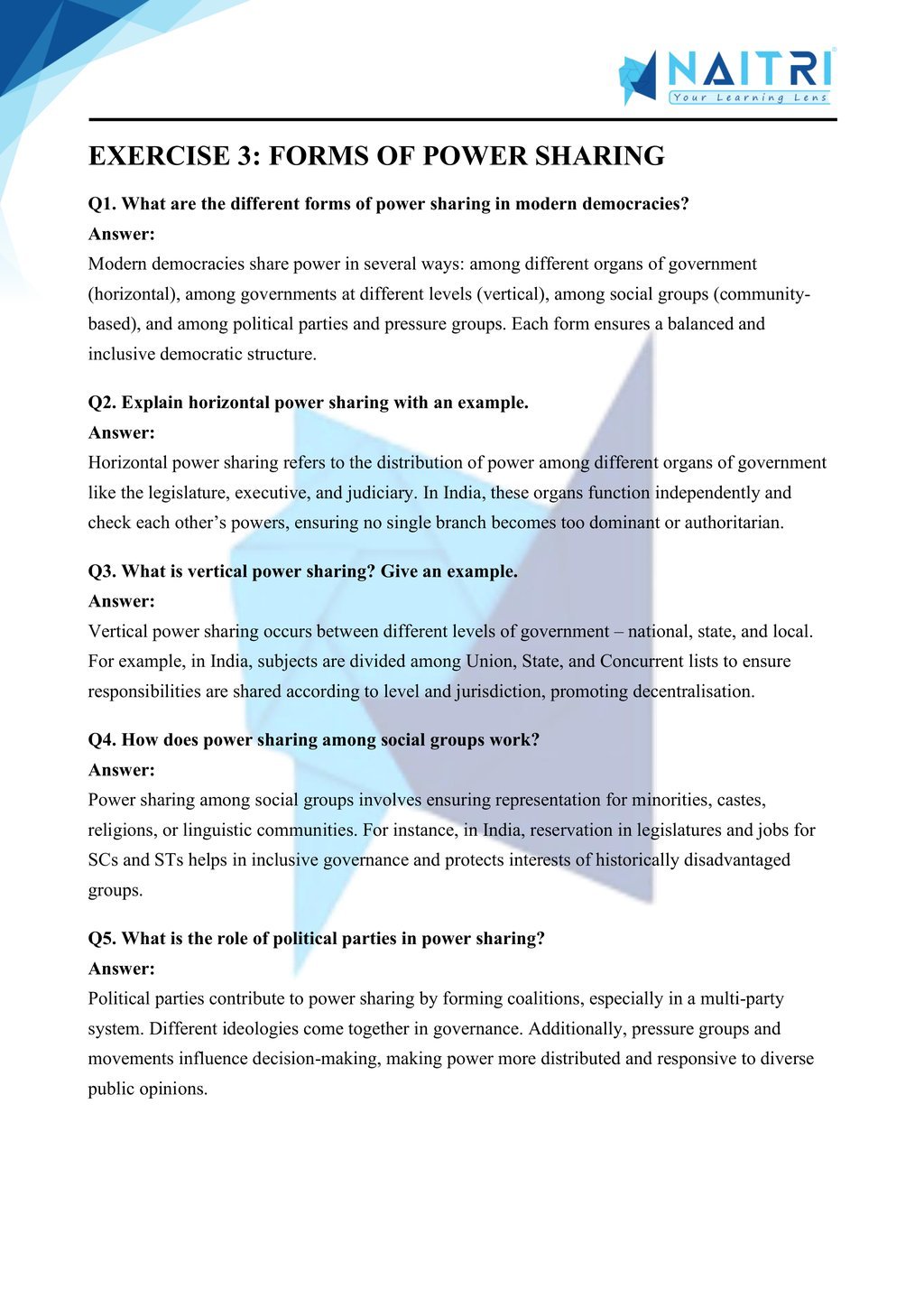
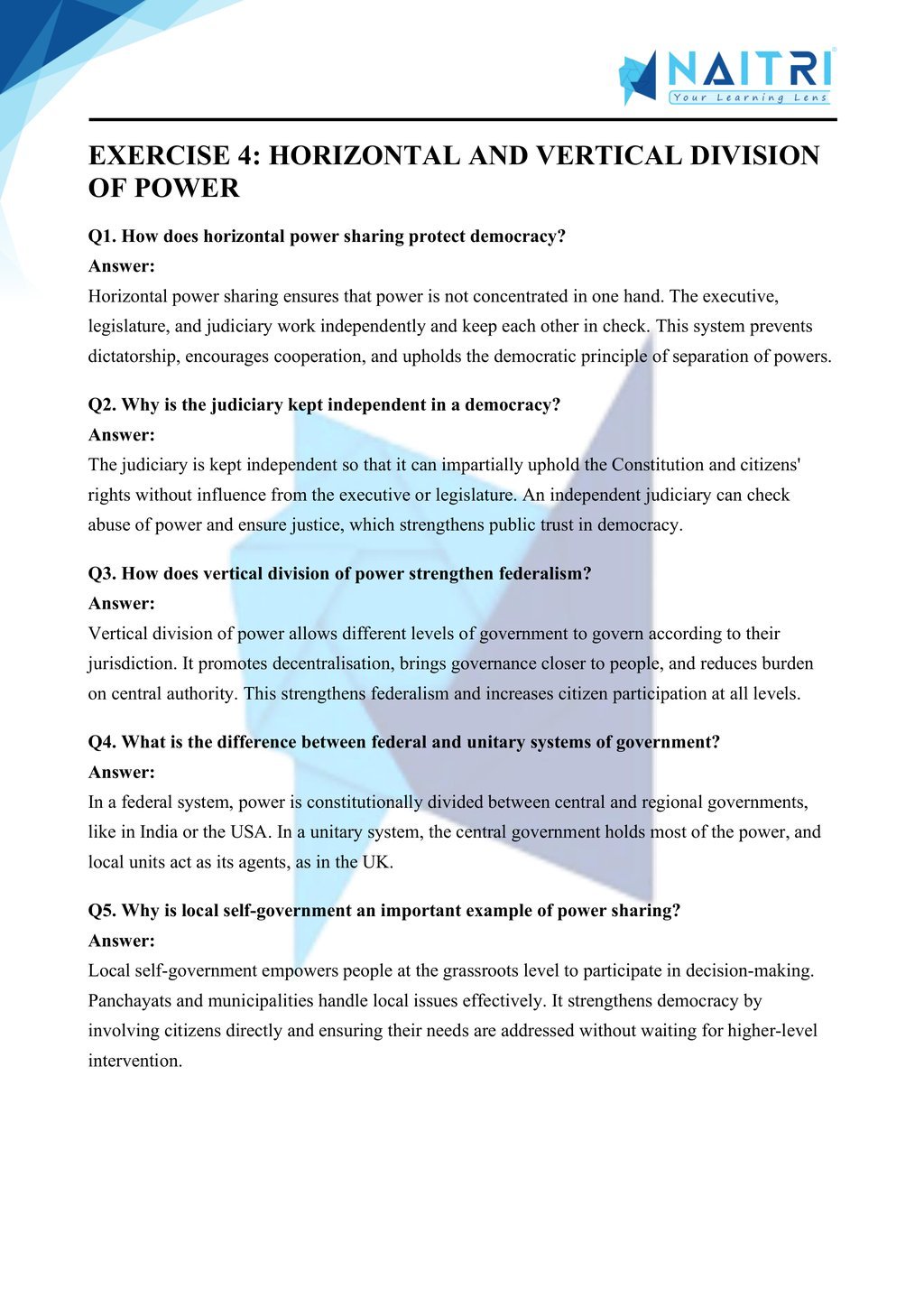
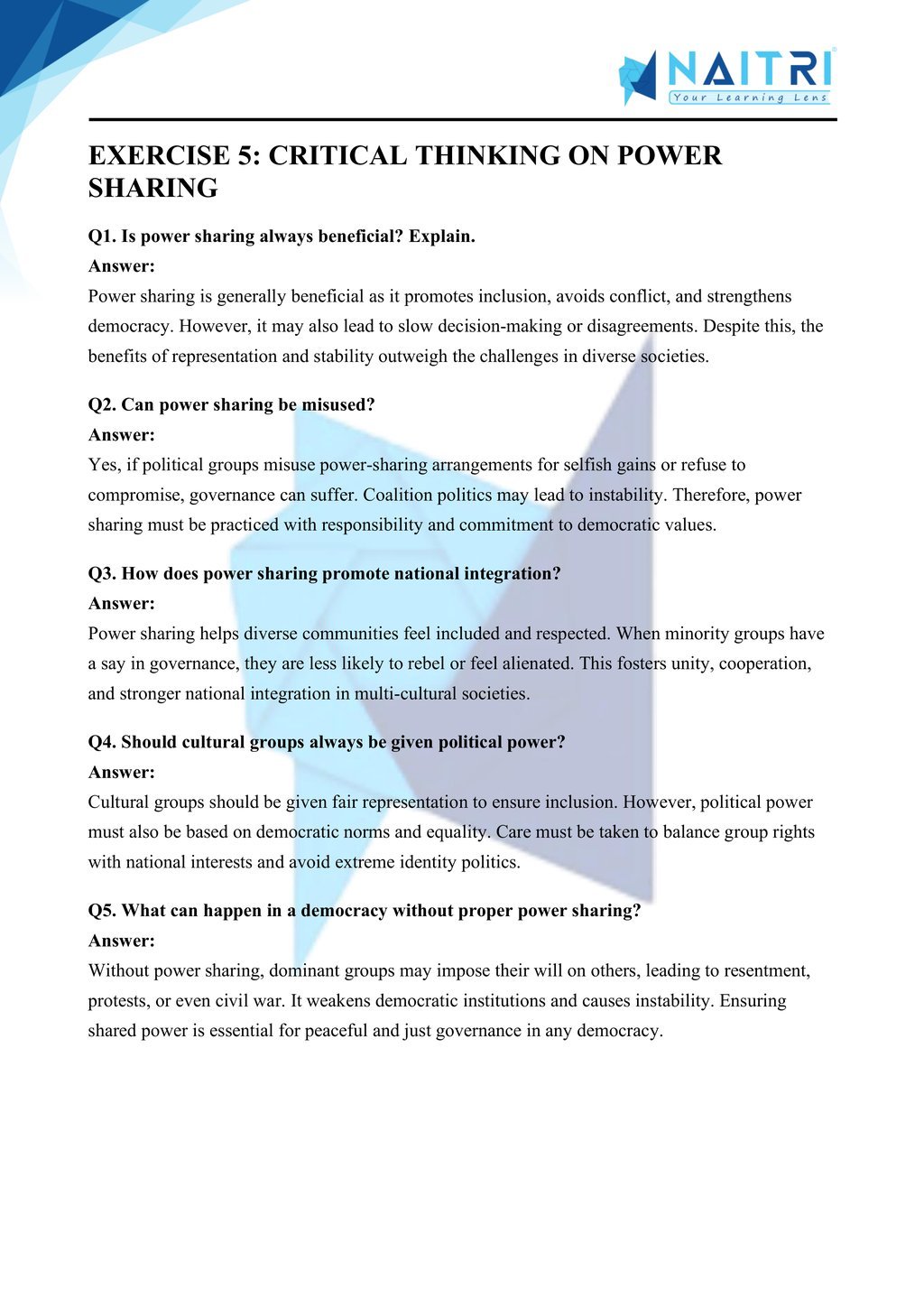
Experience Civics Like Never Before – With AR!
Understanding Power Sharing is now more exciting and immersive! With the NAITRI App, you can explore complex civics concepts through Augmented Reality (AR). Visualize government powers divide, communities cooperate, and balance of authority in action — right in front of you. Our AR-powered lessons make learning interactive, 3D, and fun, helping you retain concepts better and enjoy every topic.



Visualize . Interact . Understand . The future of learning is here
Power Sharing – Important Questions with Answers
What is power sharing?
Answer: Power sharing is the distribution of political power among different social groups or branches of government to maintain political stability and accommodate diversity within a democracy.How does power sharing promote stability?
Answer: By involving various groups—religious, ethnic, political—in governance, power sharing reduces conflict, builds trust, and prevents domination by any single group, ensuring social peace.What is the difference between horizontal and vertical power sharing?
Answer: Horizontal arrangements distribute power among government branches (legislature, executive, judiciary). Vertical arrangements share it across different levels (central, state, local governments).Why is power sharing necessary in a democracy?
Answer: It ensures that diverse voices are represented, prevents abuse of power, promotes inclusion, and makes governance more fair and effective.What example illustrates social group power sharing in Belgium?
Answer: Belgium shares power between Flemish and Walloon communities through proportional representation and separate language-based voting, reducing tensions and ensuring political accommodation.What is meant by political power sharing?
Answer: Political power sharing occurs when multiple political parties or leaders form coalitions—they share government roles, decision-making responsibilities, and authority evenly.What is federalism in the context of power sharing?
Answer: Federalism is a system where power is divided between a central government and regional governments, each having their own jurisdiction and autonomy.How does power sharing protect democracy?
Answer: It enhances representation, limits authoritarian tendencies, supports checks and balances, and increases citizen participation, making democracy more accountable.What is representative power sharing?
Answer: Representative sharing ensures that various regions, castes, religions, or ethnic groups are represented in legislative bodies and public offices.Why is decentralisation considered a form of power sharing?
Answer: Decentralisation transfers decision-making authority to local governments, enabling citizens to participate directly and improving government responsiveness at the grassroots level.How do coalitions reflect power sharing?
Answer: Coalitions involve parties making binding agreements to share government posts, policies, and resources, thus ensuring a consensus-based decision-making process.What is the Panchayati Raj system in India?
Answer: Panchayati Raj is a three-tier local governance system that gives village-level bodies authority over development, planning, and public welfare through local elected representatives.How do countries accommodate linguistic diversity through power sharing?
Answer: They implement language-based quotas, regional autonomy, and separate media channels to ensure each linguistic community has representation and cultural space.What is administrative decentralisation?
Answer: It refers to redistributing administrative responsibilities among local authorities, enabling them to deliver public services efficiently while being closer to the people.How does power sharing reduce conflict?
Answer: It ensures that diverse groups participate in governance, feel respected, and perceive decisions as legitimate, preventing social unrest and reducing tensions.What is an example of power sharing in Sri Lanka?
Answer: India’s intervention and the 13th Amendment created provincial councils in Sri Lanka to share power with Tamil minorities, aiming to reduce conflict.Repeat question – skipped.
Answer: (Note: Adjust as needed or keep numbering consistent.)What is political decentralisation?
Answer: This form of decentralisation transfers electoral powers to local governments, enabling democratic participation at lower levels and increasing accountability.What are the challenges of power sharing?
Answer: Challenges include elite capture, delayed decisions, coordination issues, and sometimes dominance by powerful groups even within shared power structures.How does India share power vertically?
Answer: Through federal structure with clear division of powers among Union, State, and Local Governments, each with its own legislative, executive, and financial authority.How is money shared in a federal system?
Answer: Financial power is shared via central transfers, tax sharing, loans, grants-in-aid, and State Finance Commissions, enabling equitable resource distribution.How does the judiciary support power sharing?
Answer: The Supreme Court interprets the Constitution, resolves conflicts between levels of government, and protects federal principles.Why is local self-government important for democracy?
Answer: It brings decision-making to local communities, makes government more responsive, strengthens participation, and improves public service delivery at the grassroots.How do coalitions impact policy making?
Answer: Coalitions require policy consensus, compromise, and greater inclusiveness, leading to balanced and broader-based governance decisions.What learning do we derive from power sharing?
Answer: It shows that democracy works best when diversity is respected, institutions share authority, and public participation is encouraged at all levels.
Power Sharing explains how political power is distributed in democracies to prevent concentration and ensure participation. Using examples from Belgium and Sri Lanka, the chapter highlights the importance of accommodating diversity. It introduces different forms of power-sharing—among governments, social groups, and organs of government. The chapter emphasizes how power sharing strengthens unity and promotes stability in a democracy.
Related Chapters You May Like
Download Naitri App
Easy, Visual Learning — Right on Your Phone
Learn with Augmented Reality! The Naitri app makes CBSE and MP Board concepts interactive and fun — even in low-resource settings. Watch lessons, complete homework, take tests, and track progress — all in one place. Anytime. Anywhere.
Available on








